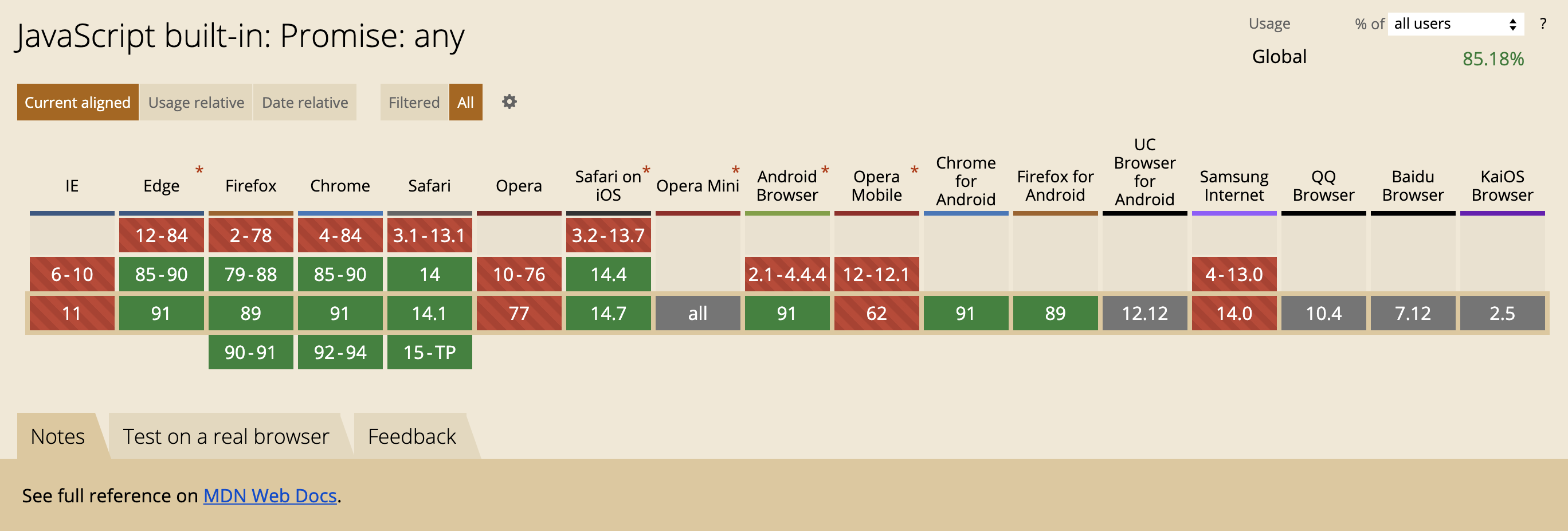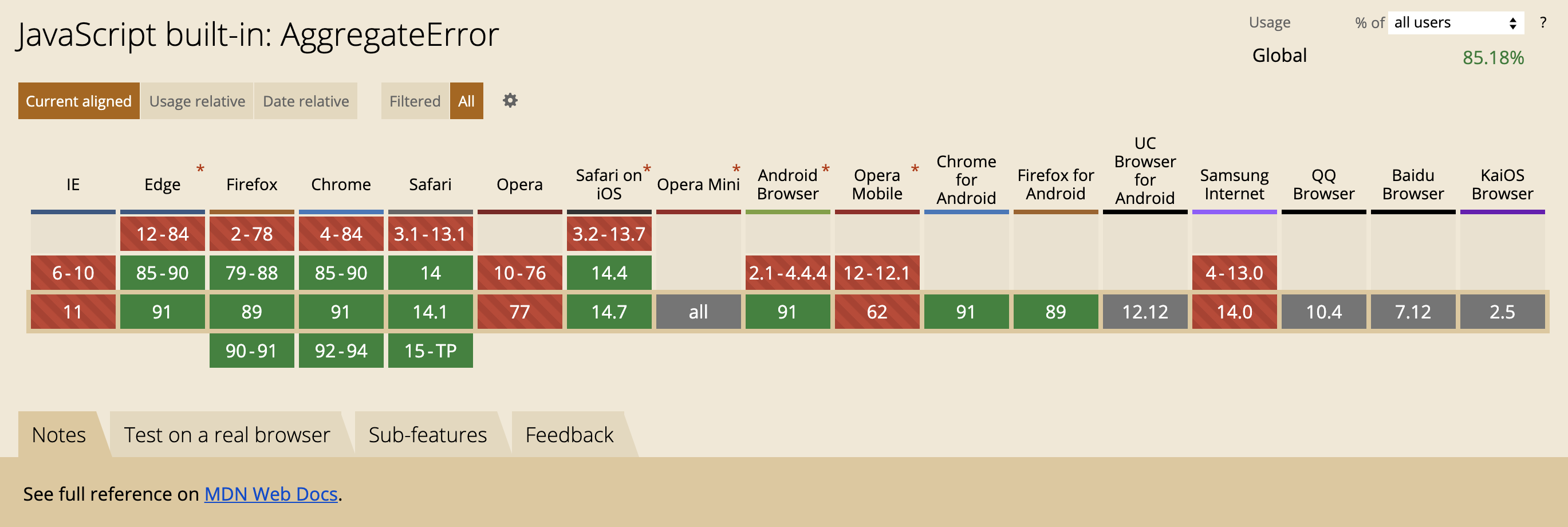Promise.any() And AggregateError In JavaScript
Table Of Contents
Nowadays, due to the increasing popularity of asynchronous programming, Promises have become an essential part of software engineer's daily routine.
Promise is an object that produces a value in the future, which represents the result of an asynchronous operation.
It has 3 states: pending - the initial state of a Promise, fulfilled - representing a successful operation, and rejected - representing a failed operation.
Once a Promise is fulfilled or rejected, it is immutable, meaning it cannot be changed.
Static Methods
Until recently, there were only a couple of built-in static methods for a Promise object: all, allSettled, race, reject, and resolve.
To learn more about them, please read this article.
Now that ES2021 has been approved and released in June 2021, there is a new static method available - any.
Promise.any()
Promise.any() takes an iterable (e.g. Array) of Promise objects and waits until one of them fulfills. Once this happens, it immediately returns a single Promise that resolves with a value from that fulfilled Promise.
If no Promises fulfill (all of them are rejected), then the returned Promise rejects with the new type of an Error - AggregateError (we will learn about it later).
If you are familiar with the Promise.all() method, then you may have guessed that Promise.any() is an opposite to it.
For now, we're done with the theory, let's get to the practice.
All Promises Resolve Sequentially
const promise1 = new Promise((resolve, reject) => {
resolve(1);
});
const promise2 = new Promise((resolve, reject) => {
resolve(2);
});
const promise3 = new Promise((resolve, reject) => {
resolve(3);
});
Promise.any([promise1, promise2, promise3])
.then(result => console.log(result)); // Prints "1"A pending Promise is returned as soon as one of the passed Promises (promise1, promise2, and promise3) is fulfilled.
The returned pending Promise resolves with a value from a previously fulfilled Promise (in our case, the returned value is 1, since promise1 resolved the fastest).
The Last Promise Resolves First
In the world of asynchronous programming the last Promise may be resolved first:
const promise1 = new Promise((resolve, reject) => {
setTimeout(() => {
resolve(1);
}, 300);
});
const promise2 = new Promise((resolve, reject) => {
setTimeout(() => {
resolve(2);
}, 200);
});
const promise3 = new Promise((resolve, reject) => {
setTimeout(() => {
resolve(3);
}, 100);
});
Promise.any([promise1, promise2, promise3])
.then(result => console.log(result)); // Prints "3"The last Promise (promise3) is the quickest to resolve, therefore we get its value (3).
One Of The Promises Rejects
Nothing is perfect, and sometimes our asynchronous operations fail for various reasons:
const promise1 = new Promise((resolve, reject) => {
reject("Something went wrong");
});
const promise2 = new Promise((resolve, reject) => {
reject("Something went wrong");
});
const promise3 = new Promise((resolve, reject) => {
resolve(3);
});
Promise.any([promise1, promise2, promise3])
.then(result => console.log(result)); // Prints "3"The first two Promises were rejected (if they were API calls, we can assume that the server responded with an error code), but the third was resolved, so we received the value of the resolved Promise (3).
All Promises Reject
In the worst case, all Promises can fail and we should handle this as well:
const promise1 = new Promise((resolve, reject) => {
reject("Something went wrong");
});
const promise2 = new Promise((resolve, reject) => {
reject("Something went wrong");
});
const promise3 = new Promise((resolve, reject) => {
reject("Something went wrong");
});
Promise.any([promise1, promise2, promise3])
.catch(error => console.log(error)); // Error: "All promises were rejected"If all passed Promises fail, an AggregateError is returned.
No Promises Passed
If no Promises are passed to the Promise.any() method, we get an asynchronously rejected Promise:
Promise.any([])
.catch(error => console.log(error)); // Error: "All promises were rejected"Short Circuit
The Promise.any() method short-circuits after the first resolved Promise, which means that it does not wait for further Promises to complete.
It is very useful when we only want to get one value and we don't care which Promise returns it.
As mentioned earlier, this method is an opposite to Promise.all(), which waits for all passed Promises to complete.
Promise.any() vs. Promise.race()
You may be familiar with the Promise.race() method, which works quite similarly, but with one small difference - it returns the first settled value (either fulfilled or rejected).
The new Promise.any() method returns the first fulfilled value and ignores all rejections.
An Example Of Promise.race()
const promise1 = new Promise((resolve, reject) => {
reject("Error");
});
const promise2 = new Promise((resolve, reject) => {
resolve(2);
});
const promise3 = new Promise((resolve, reject) => {
resolve(3);
});
Promise.race([promise1, promise2, promise3])
.catch(error => console.log(error)); // Prints "Error"An Example Of Promise.any()
const promise1 = new Promise((resolve, reject) => {
reject("Error");
});
const promise2 = new Promise((resolve, reject) => {
resolve(2);
});
const promise3 = new Promise((resolve, reject) => {
resolve(3);
});
Promise.any([promise1, promise2, promise3])
.then(result => console.log(result)); // Prints "2"AggregateError
A few times in this article we mentioned a new type of an Error - AggregateError.
Like Promise.any(), this is also a new addition to JavaScript, and it's a new subclass of an Error that groups together individual errors.
It is thrown when multiple errors have occurred within a single operation (for example, when all Promises passed to Promise.any() reject).
It contains two Instance Properties:
- name - the name of an Error, defaults to AggregateError
- message - the message of an Error, defaults to an empty string ("")
Catch An AggregateError
const promise1 = new Promise((resolve, reject) => {
reject("Something went wrong");
});
Promise.any([promise1])
.catch(error => {
console.log(error instanceof AggregateError); // "true"
console.log(error.message); // "All Promises rejected"
console.log(error.name); // "AggregateError"
console.log(error.errors); // [ Error: "Something went wrong" ]
});Create An AggregateError
try {
throw new AggregateError([
new Error("Something went wrong1"),
new Error("Something went wrong2")
], "MyErrorName");
} catch (e) {
console.log(e instanceof AggregateError); // "true"
console.log(e.message); // "MyErrorName"
console.log(e.name); // "AggregateError"
console.log(e.errors); // [ Error: "Something went wrong" ]
}Browser Compatibility
Since these two features are fairly new, we need to make sure they are supported by the most popular browsers.
Promise.any()
According to caniuse.com, it is available to just over 85% of users (as of 07/10/2021).

AggregateError
According to caniuse.com, it is available to just over 85% of users (as of 07/10/2021), so browser support is pretty similar to the support for the Promise.any() method.

It's worth mentioning that both features don't work in IE11, Opera, Opera Mobile, and Samsung Internet.
However, there is an available polyfill in core-js.
Summary
In this article, we learned about two useful features that ES2021 brings us: Promise.any() and AggregateError.
Make sure you understand them and use when needed, as in some cases they can make your developer's life easier and code cleaner.